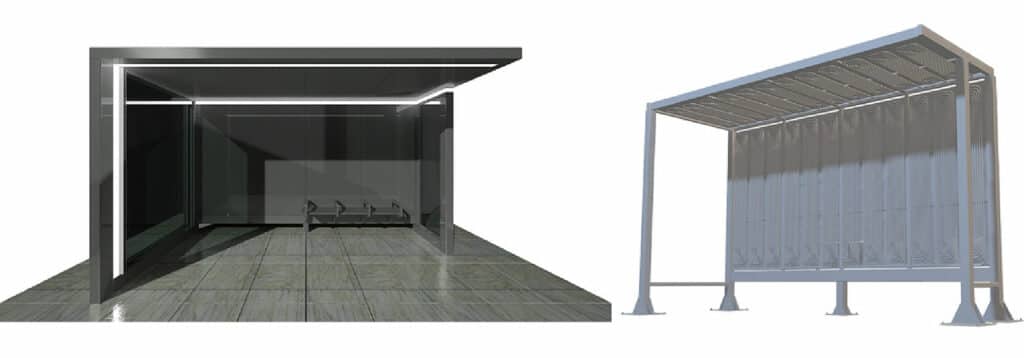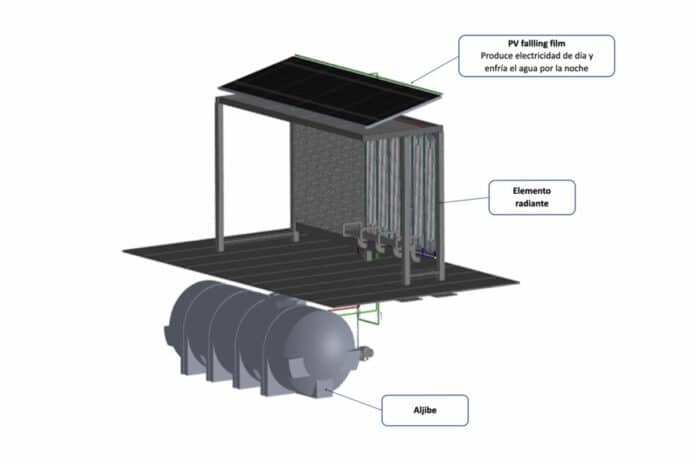Urban space is considered a harsh place for citizens in large cities due to the climate change situation. The scorching heat waves and urban heat islands (UHI) are the adverse effects on pedestrians. For this reason, large city administrations are developing climate shelters to reduce these thermal conditions.
Now, researchers from the School of Engineering of the University of Seville have designed a bioclimatic bus stop that reduces the temperature inside by up to 20 degrees.
This smart canopy detects when a user is waiting and activates its thermal conditioning system, which reduces the extreme heat of summer so that the people it houses are more comfortable and safer from the effects of climatic adversity.
A bioclimatic design takes advantage of environmental conditions and natural elements to achieve a harmonious integration with the environment. On the other hand, it has a comfortable indoor environment, which requires less energy consumption.
The proposed solar-powered canopy is based on this principle and works through thermal radiation, a form of heat or cold transfer that occurs when an object emits electromagnetic waves due to its temperature.
This bioclimatic bus stop is made up of three parts. First, an underground tank where purified water is stored. It is connected to the canopy – the structure of the bus stop – using tubes that run through its interior and up to the roof, where sensors and solar panels are installed. “Although it consists of more elements, its production is cheaper than common bus stops,” adds José Sánchez, a researcher from the University of Seville.
The canopy has a self-sufficiency system that produces electricity and cold water. It also has a series of sensors that perceive the outside temperature, human presence, and the surrounding climate so that it ‘makes decisions’ autonomously.
At night, the water in the tank rises towards the solar panels, cools down, and returns to the underground tank, where it is stored and kept cool. Upon detecting people, the bus stop activates its cooling system, and the water runs through the interior of the structure to expel cold air through tiny pores, similar in size to chickpeas.

During the day, the photovoltaic panels accumulate the energy that drives the water, and the cooling lasts from 10 to 20 minutes, the maximum period that a user usually waits for the bus.
The bus stop integrates the exterior design of the common stops and the automatic and ‘intelligent’ functionalities. The prototype is designed as a climate shelter so that it would perform its cooling function during the hottest hours of summer.
Researchers say they will continue to develop ‘smart’ parasols and canopies to improve the design of these bus stops and to build pergolas that serve as a bioclimatic shelter for children in the schoolyards.
“We are installing a 1,000-square-meter roof at the Arias Montano school in Seville to block the sun and create a cool thermal sensation. In this way, the children will be able to play and teach outside even in the hottest moments of the school period”, explains José Sánchez, in the press release.
This structure aims to achieve a climatic shelter where waiting times are more comfortable and pleasant for the user during extreme heat. The first prototype will be installed in Seville and will be operational from 2024.
Journal reference:
- MPaz Montero Gutiérrez, Teresa Palomo Amores, Rafael Monge Palma, MCarmen Guerrero Delgado, José Sánchez Ramos, Servando Álvarez Domíguez. Thermal conditioning of short-term stays. Radiant solution in a bus stop in Seville. Science Talks, 2023; DOI: 10.1016/j.sctalk.2023.100237
